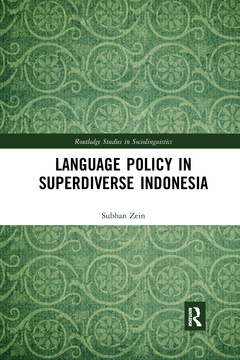Description
Language Policy in Superdiverse Indonesia
Routledge Studies in Sociolinguistics Series
Author: Zein Subhan
Language: English
Subject for Language Policy in Superdiverse Indonesia:
Keywords
Bacharuddin Jusuf Habibie; Indigenous Languages; Linguistic landscape; Language Policy; Translanguaging; Heritage Languages; politics; Indonesian Language; Language planning and policy; Language Ideologies; Language and identity; Nusa Tenggara; Language variation and change; Wetu Telu; Superdiversity; Elf Perspective; Diversity; Revitalisation Planning; language problems; Endangered Languages; Asian Language Policy; Linguistic Ecology; Indonesia; East Nusa Tenggara; linguistic genocide; Superdiversity Perspective; language revitalisation; Standard Indonesian; Indonesia's language policy; Lingua Franca; family language policy; National Language; multilingual education; Bazaar Malay; Sumpah Pemuda; Language Documentation; Heritage Language Speakers; Reverse Language Shift; ASEAN Region; Public Administration; International Language
Publication date: 09-2021
· 15.6x23.4 cm · Paperback
Publication date: 02-2020
· 15.6x23.4 cm · Hardback
Description
/li>Contents
/li>Readership
/li>Biography
/li>
Indonesia has an extreme diversity of linguistic wealth, with 707 languages by one count, or 731 languages and more than 1,100 dialects in another estimate, spoken by more than 600 ethnicities spread across 17,504 islands in the archipelago. Smaller, locally used indigenous languages jostle for survival alongside Indonesian, which is the national language, regional lingua francas, major indigenous languages, heritage languages, sign languages and world languages such as English, Arabic and Mandarin, not to mention emerging linguistic varieties and practices of language mixing. How does the government manage these languages in different domains such as education, the media, the workplace and the public while balancing concerns over language endangerment and the need for participation in the global community?
Subhan Zein asserts that superdiversity is the key to understanding and assessing these intricate issues and their complicated, contested and innovative responses in the complex, dynamic and polycentric sociolinguistic situation in Indonesia that he conceptualises as superglossia. This offers an opportunity for us to delve more deeply into such a context through the language and superdiversity perspective that is in ascendancy.
Zein examines emerging themes that have been dominating language policy discourse including status, prestige, corpus, acquisition, cultivation, language shift and endangerment, revitalisation, linguistic genocide and imperialism, multilingual education, personnel policy, translanguaging, family language policy and global English. These topical areas are critically discussed in an integrated manner against Indonesia?s elaborate socio-cultural, political and religious backdrop as well as the implementation of regional autonomy. In doing so, Zein identifies strategies for language policy to help inform scholarship and policymaking while providing a frame of reference for the adoption of the superdiversity perspective on polity-specific language policy in other parts of the world.
1. Introduction to Language Policy in Superdiverse Indonesia 2. Linguistic Ecology and Language Policy 3. Status Planning 4. Corpus Planning 5. Revitalisation Planning 6. Language-in-Education Policy 7. Conclusion
Subhan Zein (PhD, Australian National University) teaches at The University of Queensland, Australia. He is the lead editor of Early Language Learning and Teacher Education: International Research and Practice and English Language Teacher Preparation in Asia: Policy, Research and Practice (Routledge) and also the editor of Teacher Education for English as a Lingua Franca: Perspectives from Indonesia (Routledge).

